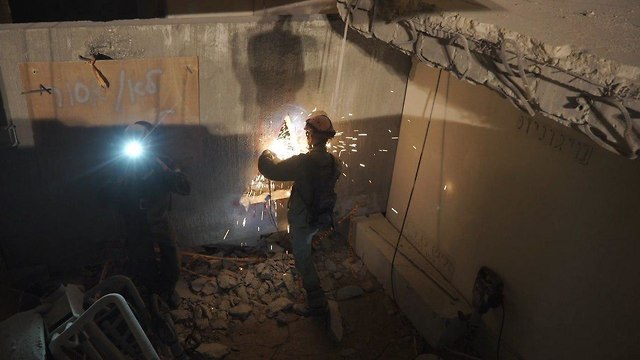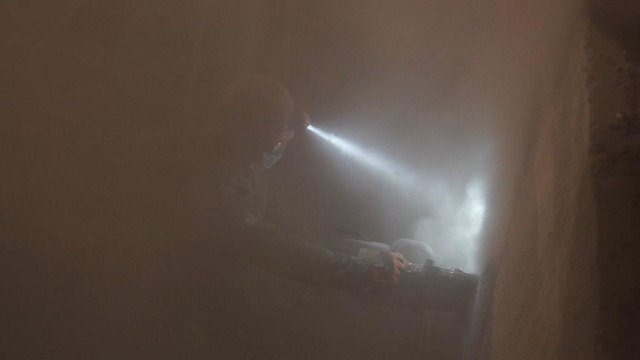
A special delegation of the International Search and Rescue Advisory Group (INSARAG), an international alliance operating under the UN and comprising 80 countries, will arrive in Israel in two months to authorize the Home Front Command 's National Rescue Unit's acceptance to the organization.
The three-day certification test will take place at two mock demolition sites at the headquarters of the Home Front Command in Ramle. The inauguration will conclude a year of inspections and mentoring by a team from a German elite rescue unit—a senior member of the organization—of Israeli forces.
Following accreditation, the Home Front Command’s rescue unit will be inducted into the alliance and be able to embark on aid missions to disaster-stricken countries around the world, under the auspices of the UN, including countries with which Israel has no relations or who are considered adversaries.
The accreditation will enable the National Rescue Unit to operate according to a strict international aid and rescue standards, which includes several parameters: the rescue mission will be dispatched to the airport in Israel within six and a half hours from the time of the call by INSARAG, quick and efficient cooperation with other international delegations, as well as high level operating and extraction techniques with safe and advanced equipment.
The decision to join the international alliance was made in Israel in 2012, but the process was only accelerated in the past two years due to delays caused by Operation Protective Edge in 2014 and the aid delegation to the earthquake in Mexico about a year ago.
The Israeli rescue unit consists of few hundred reservists, most of them rescuers of the highest caliber, including a few dozen female fighters, alongside four female combat soldiers from the IDF's canine unit and four fire fighters from the fire brigade.
The qualification test will be supervised by a team of examiners from eight countries, including a Singaporean team leader, a British dog handler and an American rescue specialist who will examine the Israeli unit.
At first, they will be tested on operational procedures and cooperation with other bodies such as the Ministry of Foreign Affairs and Defense and the Air Force.
The next step will be a practice exam: the rescue personnel will be required to be dispatched within eight hours, along with their crates of equipment. They will also undergo briefings, eight vaccinations and basic preparations, before boarding an aircraft that will fly them to the target country.
A bus ride will simulate the flight, followed by a nightly mission to examine the forces' aptitude in the construction of a small aid complex, due to the space limitations usually found in disaster-stricken cities.
The international examiners will examine whether the unit is able to set up and operate two aid sites and, upon completion, to transfer them to another foreign aid delegation in an efficient and professional manner.
The mental health and medical treatment that the members of the Israeli delegation receive from the Home Front Command after their return to Israel will also be examined.
"With all the experience and knowledge we have, over the past year we have improved a lot thanks to this qualification," a senior officer in the National Rescue Unit told Ynet. "This alliance is like a Catholic wedding: it includes a mutual commitment even during routine times throughout the year—to spread professional knowledge acquired in each unit to the other members of the organization, including rescue techniques developed and to send and host professional delegations.
“At the end of the exam process, yellow cards might be distributed with points emphasizing what we need to improve," he added.
Until now, Israel has waited for aid requests from disaster-stricken countries through the official and unofficial channels, but with their entry into the UN alliance, another channel will be opened. INSARAG, based in Switzerland, can itself dispatch the Israeli force and the Israeli rescue fighters will operate in the disaster-hit country wearing IDF uniforms.
The unit will also carry two arm bands: on the right arm, the IDF badge or the Israeli flag, and on the left, the INSARAG tag.
The 80 states making up the organization's membership are considered to be strong and well developed, and provide assistance to countries that are not members of the organization, i.e. third world countries.
"It has already occurred that we have sent a small aid delegation to a country that ultimately did not allow us to enter, as in the earthquake in New Zealand a few years ago. It will not happen again," the officer added.
"We will be examined on 126 different work techniques according to strict international standards as the Swiss and the Germans know how to. This is a NATO-like international alliance with rules of conduct. The State of Israel extends a helping hand even to countries that are adversaries,” he concluded.


















